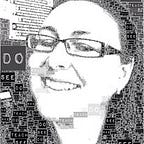Don’t just teach. Be.
Here we are, well into the 21st Century, and educators are talking a lot about what needs to change to “keep up with the future” (which is already a backwards-looking phrase), when what we really need to consider is the skills, or meta-skills, that those of us who can adapt already have and can pass on to our students. These meta-skills make up the framework of Future Literacies, a fluid and reflective map that “every future student and worker will need to be able to navigate and apply if they are to thrive tomorrow.” (Nalder, Jonathan 2017)
Every inspirational teacher I’ve ever encountered knows that the most important lessons a student learns are not always detailed in the curriculum or syllabus. These are teachers who lead by example; who infect their students with a love of learning; who think critically, are curious, and regularly evaluate information and opinions. Teachers, whether we like it or not, are Role Models.
We’ve all had a good chuckle at the various 19th Century “Rules For Teachers” doing the rounds of the interwebs. “How ridiculous!” we scoff. “There’s no way teachers would do that these days!” And that’s absolutely correct — because these “rules” (the veracity of which I have reason to doubt) are detailing behaviour that reflects the social standards of the time. More or less. It is not true, however, that teachers should not be held accountable for modelling socially acceptable, positive behaviours. Even adults learn by mimicry and will follow strong role models — it’s a large part of a teacher’s job to ensure that his or her students are capable of critically examining and selecting the behaviours that are most suitable for them to function well in society.
Sure, we’re no longer held to unreasonable standards of abstinence, and we’ve progressed to reading a book or two other than the Bible, but we are still responsible for being the kinds of people we ask our students to be. The essential skills to succeed in society have changed rather significantly over the last century or so, and continue to change rapidly. How do we use a new, dynamic framework to teach the Future Literacies that our children are going to need in twenty years’ time?
The answer is — as answers often are — both simple and incredibly complex. To prepare our students for the future, we need to leave a lot of what we already do in the past, and re-examine our practices to see how adaptable we really are.
With the explosion of social media in particular, students are no longer going to accept the “sage on the stage” as an authority. They are going to question, and sometimes the impetus for those questions is going to be from an unexpected source, so it is imperative that teachers familiarise themselves with as many sources — both reputable and otherwise — as possible, to prepare for that questioning. That means that if students are getting information from social media, a teacher who doesn’t use social media (and use it well) is immediately at a disadvantage. The requirement to model social practice extends to the virtual sphere — if you’re in cyberspace, and your students are in cyberspace, sooner or later you’re going to run into one another. Make it a controlled rendezvous, rather than a messy collision.
Build and use connections with your students. That doesn’t mean adding them on Facebook — most would consider that unprofessional at best — but rather, making sure that you’re across the latest viral threads, the scandals, the newest Youtubers. Nobody is asking you to become a child again, and I’m certainly not suggesting that you privilege celebrity affairs over atomic theory, but the more you know about their world, the more connections you’re going to be able to help them make.
Be curious. Ask them questions. Let them discover how much they really do know about a subject, or how much they can find out. Collaborate. Be agile in your thinking, and quick to respond to current events — there is always some way to link what’s happening now with a lesson concept. Adapt. Create. Demand that your students take responsibility for their own actions, and give them appropriate credit for each success, small or large. Give them a platform and let them build their own stories.
Let them be.
